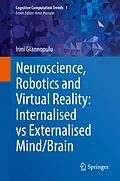This is the first volume in the Cognitive Computation Trends book series, summarising our understanding on the neural correlate of memory, perception-representation, action, language, emotion and consciousness and their mutual interactions.
Integrating research in the field of the Neuroscience, Robotics and Virtual Reality, this book is an original and attainable resource that has not been developed in any other writing. In 5 chapters, the author considers that representations are based on allegorical traces and are consciously and/or unconsciously embrained, and that the creation of robots is the expression of the mind. Whole-body virtual motion is thought of as the archetypal expression of virtual reality. Therefore, visual reality is analysed in a context of visuo-vestibular and somesthetic conflict while mixed and augmented reality are scrutinised in a context of visuo-vestibular and somesthetic interaction.
This monograph is an indispensable handbook for students and investigators engaged in history of science, philosophy, psychology, neuroscience, engineering and those interested in there interconnections. The ambition of the book is to give students and investigators ideas on which they can build their future research in this new blooming area.
Inhalt
Preface
Chapter 1 Introduction
Chapter 2 The mind
The past is prologue: a brief history of Mind and Brain
The internalised brain-machine
The theory of mind localisation
Cerebral Transparency Techniques
Neuro-Cognitivism/Neuro-Constructivism
Neurosymbolism or how wor(l)d meaning may be grounded in perceptual Experience
Chapter 3 Dynamic Embrained Systems
Cognitive models and neural support for memory systems
Dynamic multimodal perceptual processes: a neural network
From perception to action
From motor action to verbal action
Neural correlates of emotional and cognitive interaction
Self-Consciousness vs Consciousness
Chapter 4 Externalised Mind 1 &nbs...
